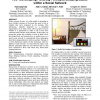Free Online Productivity Tools
i2Speak
i2Symbol
i2OCR
iTex2Img
iWeb2Print
iWeb2Shot
i2Type
iPdf2Split
iPdf2Merge
i2Bopomofo
i2Arabic
i2Style
i2Image
i2PDF
iLatex2Rtf
Sci2ools
95
Voted
CSCW
2008
ACM
2008
ACM
Are you sleeping?: sharing portrayed sleeping status within a social network
Within a group of peers, it is often useful or interesting to know whether someone in the group has gone to bed or whether they have awakened in the morning. This information, naturally integrated as a peripheral augmentation of an alarm clock, allows people to know whether it is appropriate to make a call or feel more connected with someone living remotely. In this paper, we present the design and evaluation of such an alarm clock, the BuddyClock, and describe how it enables users in a small social network to automatically share information about their sleeping behaviors with one another. Through 36 week deployment studies of this technology with five different social networks, we found that the alarm clock affected participant behaviors and allowed them to feel more connected to those with whom they shared their sleeping behaviors. Author Keywords HCI, Communication, Contextual information, Design, Sleep, Sleeping behavior, Social computing, Persuasive Technology ACM Classification ...
| Added | 19 Oct 2010 |
| Updated | 19 Oct 2010 |
| Type | Conference |
| Year | 2008 |
| Where | CSCW |
| Authors | Sunyoung Kim, Julie A. Kientz, Shwetak N. Patel, Gregory D. Abowd |
Comments (0)

